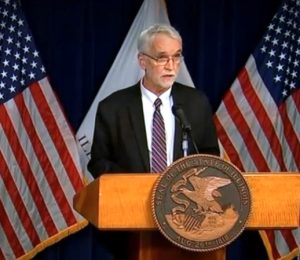University of Illinois lab approved for ‘game changer’ COVID-19 test
By Jerry Nowicki Capitol News Illinois — August 20, 2020
UI President Timothy Killeen addresses the news media at a COVID-19 news conference in Chicago on Aug. 19 in which the university announced it had been given FDA approval for a faster, cheaper saliva-based COVID-19 test. ( Blueroomstream.com)
SPRINGFIELD — As the state’s rolling COVID-19 test positivity rate increased again Wednesday, Aug. 19 Gov. J.B. Pritzker and representatives of the University of Illinois announced a testing breakthrough which they said could eventually allow for greater suppression of new cases of the virus.
The state’s flagship public university was granted U.S. Food and Drug Administration approval for rapid saliva-based testing similar to what is being used to test NBA players during their resumed season in Florida.
“Today’s announcement is yet another game changer,” UI President Timothy Killeen said at a news conference in Chicago on Wednesday, Aug. 19. “The pioneering saliva-based testing developed by our leading-edge researchers in Urbana produces rapid results at costs that allow and permit large-scale surveillance testing. That combination is a key to curbing the virus, allowing isolation early enough to limit the spread of the infection.”
The test also identifies those who are not showing symptoms.
The similarity of the UI’s testing method to one used by Yale university allowed it to be approved under the umbrella of an already-approved FDA Emergency Use Authorization. The process is known as a “bridging study” connecting the UI to the Yale research. Because the UI’s test was shown to be “non-inferior” to Yale’s, approval was granted.
Dr. Martin Burke, a UI chemistry professor who helped design the test, said the approval “could be repeated in other labs to now allow that same type of transition into using our test under the umbrella of that FDA EUA approval.”
“Direct saliva testing can address bottlenecks of time, cost and supplies,” he said.
The rapid test, combined with contact tracing and other virus mitigation efforts, could help public health officials identify outbreaks before they get out of hand. Killeen said the UI has created an internal unit at the system level “that is working with the governor and his team to share the technology in Illinois.”

Dr. Ngozi Ezike addresses the news media at a COVID-19 news conference in Chicago Wednesday. (Blueroomstream.com)
“Known as SHIELD Illinois, this will work to expand capacity in hopes of benefiting other universities, K through 12 schools and public and private institutions across the state,” he said.
Officials from UI would not put a timeline on when the tests would be widely available, however, and the governor said it will not be immediate.
“We’re not going to be able to get these tests in people’s hands in districts before schools open in the next month. It’s not going to happen,” Pritzker said. “However, over the next couple of months, there is the possibility that with these bridging studies, with greater approvals, that we’ll be able to do much, much more across the state, and the state of Illinois is a partner in that endeavor.”
UI Urbana-Champaign Chancellor Robert Jones said the university tested 10,000 students and staff with the saliva-based test Monday, which was about 1.3 percent of the national testing output that day.
“That is why we believe that this test is such a breakthrough for our university, but perhaps more importantly for our state, for our nation and for the world,” he said, noting it is also a more affordable method of testing than nasal swabs, which are currently more common.
The test requires the subject to “drool a small amount into a sterile test tube,” according to a news release from the university. Tests yield results in hours, even at high testing volumes, and the UI has performed more than 50,000 tests since making walk-up testing available to faculty, staff and students in July. It expects to conduct about 20,000 tests a day when the fall semester begins next week.
Illinois Department of Public Health Director Dr. Ngozi Ezike said at the news conference that diligence is still needed in social distancing, wearing face coverings and washing hands as Illinois’ COVID-19 metrics continue in the wrong direction. She also urged all Illinoisans to get a flu shot “as early as possible” when they are available and to get regular exercise.
“I’ve heard people say that the numbers aren’t that bad, they’re only increasing a little, we’re better than other states, we don’t really need to be that strict,” she said. “The truth is, we are better than most states, but that’s true today, but we are going in the wrong direction.”
For the past four weeks, the U.S. has seen a collective positivity rate decrease, while Illinois’ has increased over that span.
The state’s rolling seven-day positivity rate increased by one-tenth of a percentage point for the fourth straight day Wednesday, hitting 4.4 percent. That’s a full percentage point increase since July 24.
For the first time, the state surpassed 50,000 tests results reported in a 24-hour period, with 50,299 completed tests yielding 2,295 confirmed cases — a one-day positivity rate of 4.6 percent.
IDPH also reported another 25 virus-linked deaths, bringing the total casualties since the pandemic began to 7,806. There have been 211,889 confirmed cases among 3.48 million tests completed since the pandemic began.
Hospitalization numbers remained slightly above pandemic lows at the end of Tuesday as well, 1,519 people in Illinois were reported to be in the hospital with COVID-19. Of those, 334 patients were in the ICU and 144 patients with COVID-19 were on ventilators.







